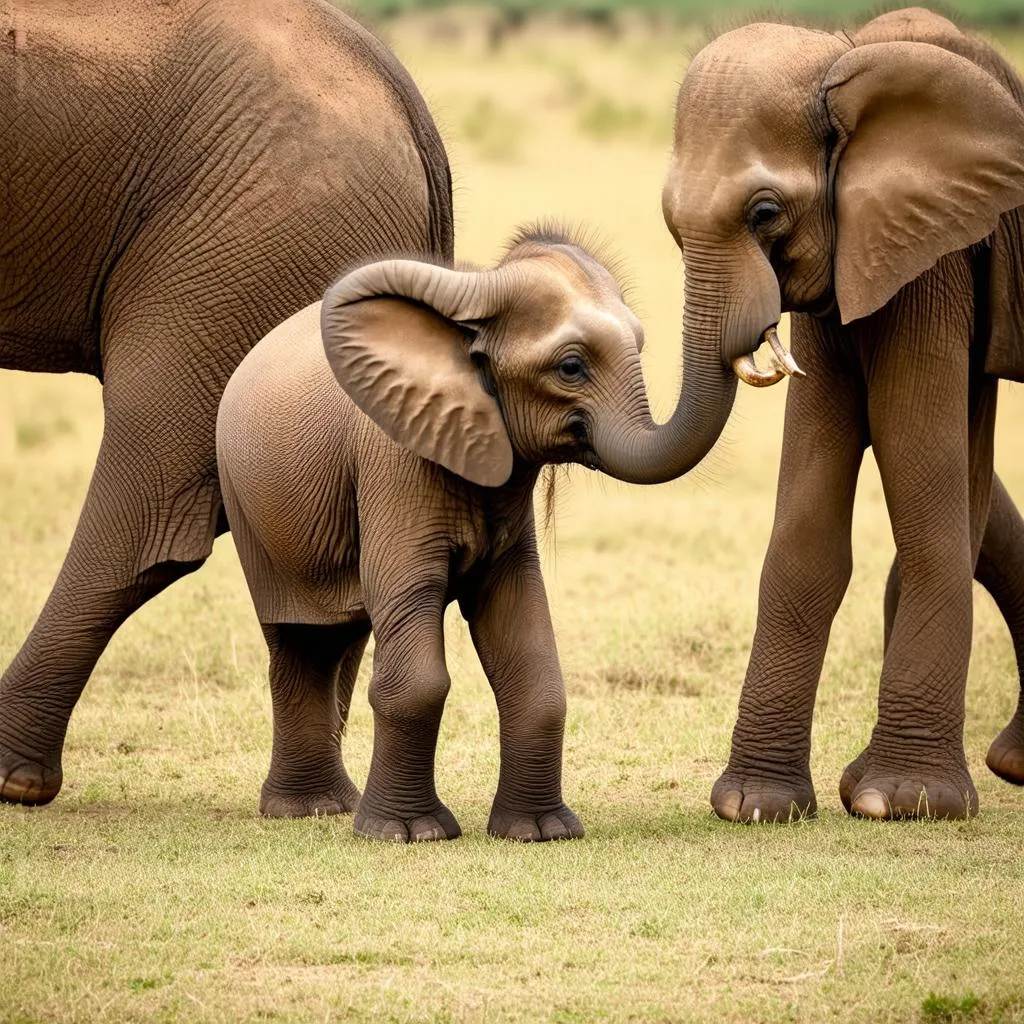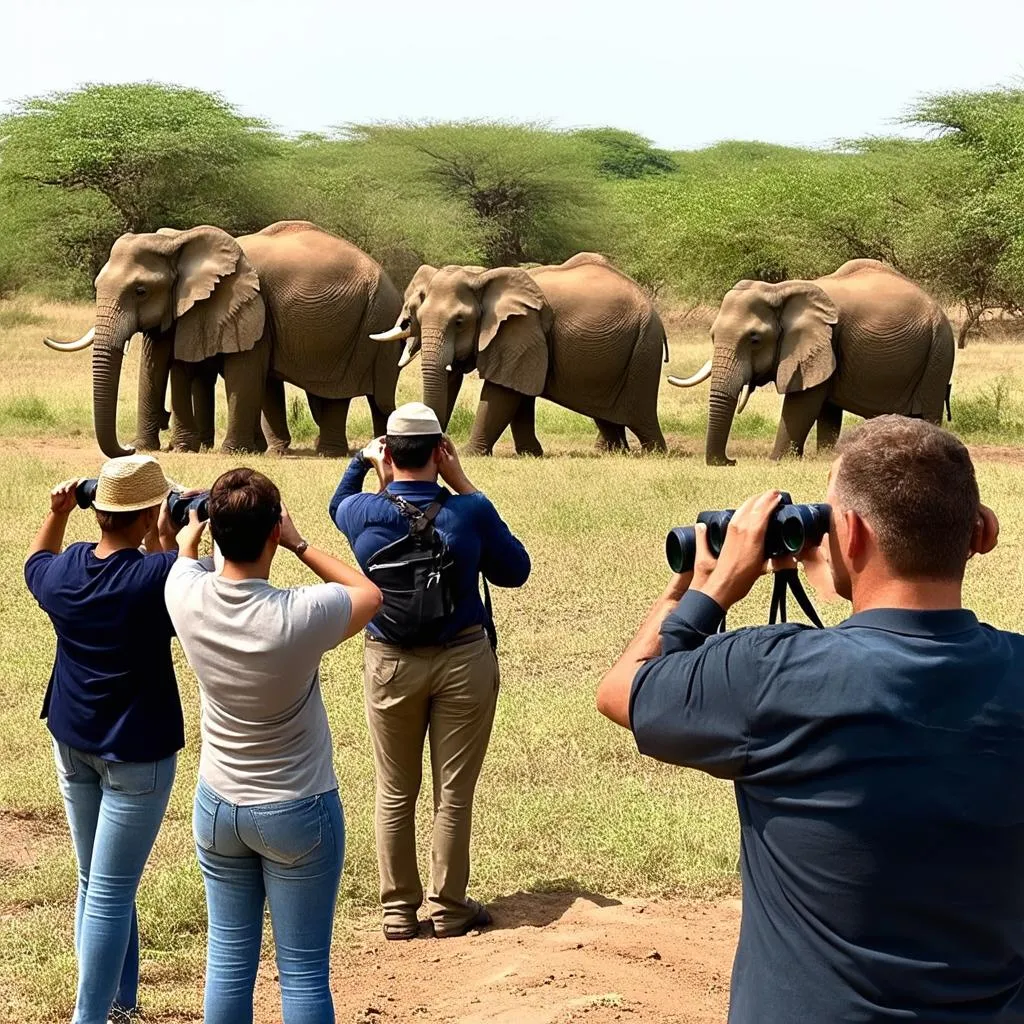“An elephant never forgets,” the old saying goes. But did you know that this impressive memory is just one facet of their intricate social lives? One of the most frequently asked questions about these magnificent creatures is, “Do Elephants Travel In Herds?”. The answer is a resounding yes, and the reasons why are as fascinating as the animals themselves.
More Than Just a Group: Understanding Elephant Herd Structure
Elephants aren’t just randomly gathered; they form highly structured herds led by the oldest and most experienced female, the matriarch. Imagine her as a wise elder, guiding her family across the savannas of Kenya or the lush forests of India.
The Matriarch: A Leader with a Trunk Full of Knowledge
The matriarch, often a grandmother or even a great-grandmother, holds a wealth of knowledge. She remembers the best feeding grounds, water sources, and safe havens, crucial for the herd’s survival, especially during droughts. Think of her as a living, breathing map, navigating her family through years of experience and inherited wisdom.
A Family Affair: The Bonds that Bind
A typical herd comprises the matriarch, her daughters, sisters, and their calves. This tight-knit group operates as a true family unit, with aunts helping raise young ones and older siblings babysitting their younger counterparts. This social structure is vital for the calves’ development, allowing them to learn essential survival skills from experienced members.
 Elephant Calf with Herd
Elephant Calf with Herd
Why Travel in Herds? Strength in Numbers
There’s a good reason why elephants stick together: safety. Traveling in a herd provides several advantages in the wild:
- Defense against Predators: A lone elephant, especially a young one, is vulnerable to attacks from lions and crocodiles. However, a herd presents a united front, with older and larger elephants fiercely protecting the vulnerable.
- Finding Food and Water: Resources can be scarce, especially during dry seasons. The matriarch’s memory and the collective foraging power of the herd significantly increase their chances of finding food and water.
- Raising Calves: Elephants have an extended childhood, relying on their mothers and other herd members for up to several years. The herd provides a safe and nurturing environment for calves to learn and grow.
When Herds Separate: A Natural Part of Life
While elephants are highly social, there are times when herds split. This is often a natural part of their life cycle. For example, young males eventually leave the herd to avoid inbreeding and form bachelor groups, while some females may break away to establish their own families.
Witnessing the Majesty: Ethical Elephant Tourism
Seeing elephants in their natural environment is a truly humbling experience. If you’re planning a trip to a destination like Kenya, remember to choose ethical tourism options that prioritize the well-being of these animals. You can learn more about responsible travel to Kenya on our website. https://travelcar.edu.vn/do-i-need-a-visa-to-travel-to-kenya/
 Tourists Observing Elephants
Tourists Observing Elephants
FAQs: Common Questions About Elephant Herds
- How big can elephant herds get? Herd sizes vary depending on environmental factors but can range from a few individuals to over 100 elephants.
- Do elephants ever leave their herds permanently? Yes, young males typically leave to avoid inbreeding, and some females may form their own herds.
- Are there disadvantages to traveling in a herd? While herds offer many benefits, they can also face increased competition for resources, especially in overgrazed areas.
Embracing the Journey: The Wisdom of the Herd
Elephants, with their complex social structures and unwavering family bonds, offer us a glimpse into the power of unity and collective wisdom. Observing these gentle giants reminds us of the importance of community, leadership, and the enduring strength of family.
For those seeking a deeper understanding of these magnificent creatures, consider exploring the diverse travel destinations where you can witness their majesty firsthand. Always remember to prioritize ethical tourism practices that respect the animals and their environment.
If you’re interested in learning more about elephant conservation efforts and responsible travel, visit travelcar.edu.vn for insightful articles and travel guides.